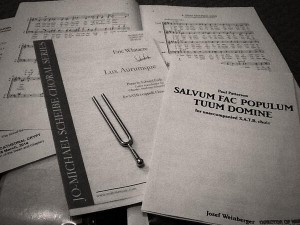How soon the Crypt concert comes around; it hardly seems a year since we were preparing for last year’s performance, and yet the wheel has turned once more, and here we are looking ahead to tonight’s concert.
I’m particularly excited about tonight, as a British composer Paul Patterson will be present in the audience, to hear the Chamber Choir sing his wonderfully serene Salvum Fac Populum Tuum Domine. It’s always nerve-wracking when the composer arrives to hear you perform his piece, but it’s a great privilege for us to have such a colossal figure on the British musical landscape coming to hear the Choir. I hope he approves of what we are doing with his music…
 This morning’s critical pre-performance tasks have already been achieved: see offspring off to school, iron concert-shirt, polish shoes, leap around on Twitter to promote tonight’s concert; now I can sit with the music and work through the scores, until heading towards the crypt for this afternoon’s rehearsal. The first moment we sing in the Crypt on the Friday afternoon is always a memorable moment, particularly for those members of the Choir who haven’t sung there before; the rich, sonorous acoustics take your sound and echo it around for several seconds. We’re very excited at the prospect of launching the opening of Eric Whitacre’s Lux Aurumque into that historic space.
This morning’s critical pre-performance tasks have already been achieved: see offspring off to school, iron concert-shirt, polish shoes, leap around on Twitter to promote tonight’s concert; now I can sit with the music and work through the scores, until heading towards the crypt for this afternoon’s rehearsal. The first moment we sing in the Crypt on the Friday afternoon is always a memorable moment, particularly for those members of the Choir who haven’t sung there before; the rich, sonorous acoustics take your sound and echo it around for several seconds. We’re very excited at the prospect of launching the opening of Eric Whitacre’s Lux Aurumque into that historic space.
Of course, the most challenging part of the rehearsal will be organising formation and processing in and out with sufficient dignity, bowing all at the same time, deciding in which hand we hold the folders (and sometimes, which way up; no detail left unobserved…). The music has been learnt; the logistics of operating in the venue, however, we’ll be picking up this afternoon.
Right, enough procrastination; the scores are waiting in a highly accusatory manner. See you after the concert.

 The moment of epiphany came during Whitacre’s ravishing Lux Aurumque; flying now without piano support, we launched into those colourful opening chords; it was fine, but wasn’t really working properly; the notes were in place, but the colours weren’t coming. ‘Listen,’ I said – ‘now really listen to one another – watch someone who comes in when you do – listen to another part and work your dissonance against theirs. Be aware of everyone around you, and commit to the sound.’
The moment of epiphany came during Whitacre’s ravishing Lux Aurumque; flying now without piano support, we launched into those colourful opening chords; it was fine, but wasn’t really working properly; the notes were in place, but the colours weren’t coming. ‘Listen,’ I said – ‘now really listen to one another – watch someone who comes in when you do – listen to another part and work your dissonance against theirs. Be aware of everyone around you, and commit to the sound.’